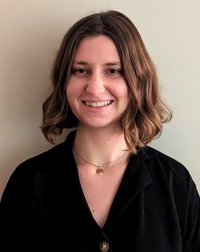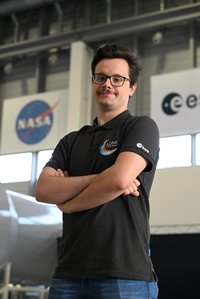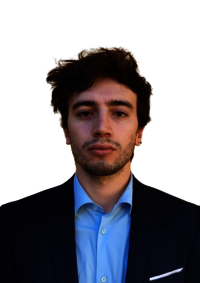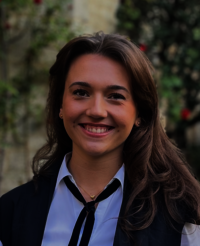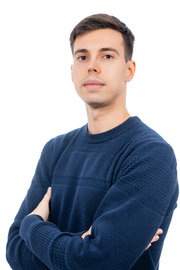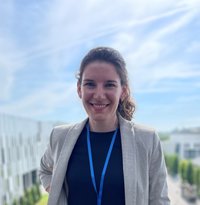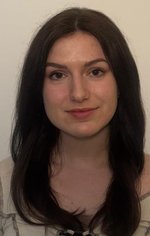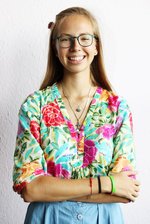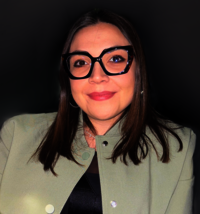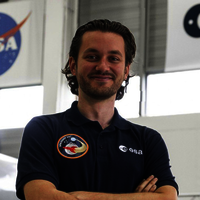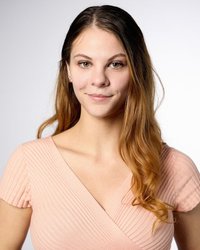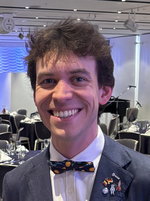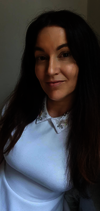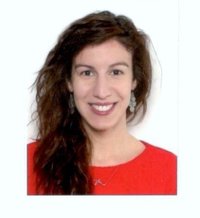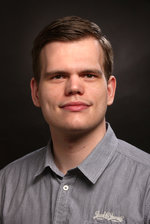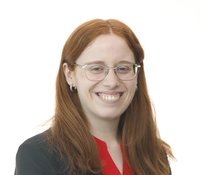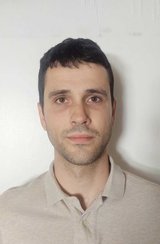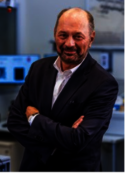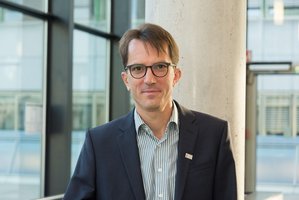Anna Becker (Germany)
My name is Anna Becker and I am a first-year PhD student. I studied physics at Heidelberg University and graduated in 2023. For both my Bachelor’s and Master’s theses, I conducted research at the German Cancer Research Center (DKFZ), specializing in medical physics. During my studies, I received the Marie Sklodowska-Curie Fellowship from the International Atomic Energy Agency (IAEA) and subsequently completed an internship at the IAEA Dosimetry Laboratory in Vienna/Seibersdorf, Austria. Since October 2024, I am pursuing my PhD at the University of Applied Sciences Mittelhessen (THM) in Gießen, focusing on Monte Carlo simulations and neutron dosimetry in the context of proton FLASH therapy.
Karol Bresler-Przybył (Germany)
Karol Bresler-Przybył holds degrees in Aerospace (BSc) and Electrical Engineering (MSc) from the Warsaw University of Technology. During his studies he was an active member of the Students’ Space Association as vice-president and president, as well as contributing to scientific projects such as IGLUNA GLACiER and BEXUS 33 TOTORO. His master’s thesis focused on designing the power supply for the Fine Guidance System of the ARIEL satellite, for which he received a TEAM TECH grant from the Foundation for Polish Science. After graduation, Karol worked on avionics for the ILR-33 Bursztyn 2K rocket and nanosatellite propulsion systems. At ESA, he works as a systems engineer at the LUNA facility, creating a unique testbed for future Moon missions and habitation concepts. In the future, he plans to pursue a PhD focusing on radiation effects mitigation in COTS electronics. In his free time, Karol enjoys board games, painting models, and fantasy books. holds degrees in Aerospace (BSc) and Electrical Engineering (MSc) from the Warsaw University of Technology. During his studies he was an active member of the Students’ Space Association as vice-president and president, as well as contributing to scientific projects such as IGLUNA GLACiER and BEXUS 33 TOTORO. His master’s thesis focused on designing the power supply for the Fine Guidance System of the ARIEL satellite, for which he received a TEAM TECH grant from the Foundation for Polish Science. After graduation, Karol worked on avionics for the ILR-33 Bursztyn 2K rocket and nanosatellite propulsion systems. At ESA, he works as a systems engineer at the LUNA facility, creating a unique testbed for future Moon missions and habitation concepts. In the future, he plans to pursue a PhD focusing on radiation effects mitigation in COTS electronics. In his free time, Karol enjoys board games, painting models, and fantasy books.
Lorenzo Castelli (Italy)
I am Lorenzo Castelli, a PhD student in physics at the University of Trento and Scuola Normale Superiore. I completed my bachelor's and master's in physics at the University of Pisa, where I developed a deep interest in radiation biophysics and its applications in radiotherapy. My
current research focuses on in silico modeling of multiscale radiation damage. I use Monte Carlo methods and reactive molecular dynamics to explore the mechanism of damage evolution across various irradiation setups and biological targets, aiming to provide a comprehensive understanding of these processes.
Phoebe De Meulemeester (Belgium)
My name is Phoebe De Meulemeester. I am a curious and driven person who wants to understand how the human body functions on a molecular level and how environmental stimulants can have an impact. PhD, Faculty of Medicine and Pharmacy – Vrije Universiteit Brussel (2024 – Present) Investigating the influence of the space environment on channel opening in the liver and the pathological effects it has.
Regulatory Submissions Coordinator – Medpace Inc. (2023-2024)
Space Studies, Advanced Master, KU Leuven/University of Gent (2022-2023) Biochemistry and Biotechnology, Bachelor and Master of Science, University of Gent (2016-2022)
Grace Frost (UK)
Grace Frost is an IAEA Marie Curie Fellow and full academic scholar from the University of Oxford, where she completed an MSc in Medical Physics and Radiobiology within the Department of Oncology. Her earlier research focused on improving MRI acquisition protocols for neuroimaging, with applications in the early detection of age-related diseases. She is currently based at the UK’s first Space Innovation Lab, where she analyses transcriptomic data from NASA and ESA missions to study how microgravity and radiation influence ageing at the molecular level.
Her research aims to leverage the space environment to uncover mechanisms of neurodegeneration and age-associated disease, with a view to developing novel therapeutics. She holds a First-Class BSc in Physics and was funded during the COVID-19 pandemic to contribute to technical manufacturing improvements in lateral flow diagnostic devices. Grace is passionate about bridging interdisciplinary fields and using her background in physics to better understand complex biological systems.
Juan Garrido Moreno (Spain)
My name is Juan Garrido Moreno and I am an aerospace engineer, specialized in control software for astronomical instrumentation. I hold a B.Sc. and an M.Sc. in Aerospace Engineering from the Polytechnic University of Catalonia, and an M.Sc. in Modelling for Science and Engineering from the Autonomous University of Barcelona.
In my current position at SENER, I contribute to the development of optomechanical and robotic subsystems for the Extremely Large Telescope project. I am responsible for the design and implementation of autonomous diagnostics and motion algorithms, ensuring their optimal robustness and precision. Additionally, I have prior experience as a mechanical engineer with a strong background in structural analysis and materials, which is highly useful for devising the interaction between hardware and software.
My areas of interest include the effects of radiation on electronics and optics, especially in the context of high-accuracy and high-sensitivity instrumentation.
Jeannette Jansen (Auditor) (Germany)
Jeannette Jansen is a senior PostDoctoral Scientist working in the Space Radiation Biology lab within the Biophysics Department at GSI. She studied Physics in Mainz and Heidelberg and she spezialized in medical physics. She completed her PhD at the German Cancer Research Center (DKFZ) in Heidelberg in 2021/2022 and investigated the role of oxygen in the FLASH effect, for which she was awarded with the Behnken-Berger-Award. She then pursued a Post Doc in Lausanne, Switzerland to learn more about radiation biology in the FLASH effect. In 2024, she joined GSI, working now on both clinical and space applications of radiation biology.
Agnieszka Jugowicz (UK)
My name is Agnieszka Jugowicz and I am a PhD student at University of Manchester's PRECISE Group specialising in computational modelling of DNA damage and repair pathways following proton irradiation. I recently completed a research period as Visiting Expert at the European Astronaut Centre. During my time at the EAC, I supported the development of a machine learning model designed to support European Space Agency’s analysis of space radiation effects on astronauts’ health, and built a computational tool allowing estimation of terrestrial radiation exposure prior to spaceflight. My expertise is in Monte Carlo simulations, Geant4, and radiation biology.
Anna Jurga (Poland)
Dr. Anna Jurga is an environmental engineer and researcher passionate about building sustainable life support systems, both for future space habitats and for a climate-challenged Earth. Since 2022, she holds a PhD from Wroclaw University of Science and Technology (Poland), where she focused on resource recovery and circularity in controlled ecological systems. Her doctoral work explored urine-based fertilizer production and soilless plant cultivation, aiming to close water and nutrient loops in space conditions.
She has contributed to international projects such as EU-founded LUWEX, which developed water extraction and purification technologies for lunar applications and was selected as a trainee in NASA’s SHINE program, where she deepened her understanding of space health and radiation biology.
Currently, she works as a Research Assistant at WUST and as a lead R&D scientist in a vertical farming company, applying lessons from space system engineering to develop resource-efficient cultivation models on Earth. Her mission is to advance environmental technologies that support both space exploration and terrestrial sustainability. She aims to integrate knowledge of radiation biology into the design of resilient biotechnologies for space-based ecological systems.
Uladzislava Panfiorava (Auditor) (Germany)
Name:Uladzislava Panfiorava
Field: M.Sc. Physical Biology of Cells and Cell Interactions with the focus on space biology.
Education: Goethe University Frankfurt am Main - M.Sc. in Physical Biology of Cells and Cell Interactions (expected 2026).
ThesisTopic: Formation and Subsequent Exposure of Bone Marrow Spheroids in the 2D- clinostat.
Skills: 2D and 3D cell culture, Molecular cloning, Immunostaining, Colony Survival Assay, Confocal, Light-Sheet and Electron Microscopy.
Software: R, ImageJ, Microsoft Office, Photoshop, Sony Vegas.
Experience: GSI Internship in Space Radiation Biology; Moon Village 2.0 (Goethe University), International Space Weather Camp (DLR).
Languages: German (C2), English (B2), Spanish (B1), Belarussian (native), Russian (native), German Sign language (DGS4).
Goal: Interested in a PhD in space biology and human health.
Virginia Pietrosanti (Italy)
I am Virginia Pietrosanti and I am currently in the third year of an industrial PhD program co-financed by Thales Alenia Space Italy, at the University of Rome “Tor Vergata”. I hold a Master’s Degree in Physics with a specialization in Material Sciences from the same university. My doctoral research focuses on the study of radiation-matter interactions, with particular emphasis on the effects of space radiation on commercial-off-the-shelf electronic components used in space and avionics systems, along with radioprotection and shielding strategy assessment. My experimental activities include irradiation campaigns at the ISIS Neutron and Muon Source (UK), working with atmospheric-like and monoenergetic neutrons. My expertise includes simulations of single event effects and particle transport using Monte Carlo methods and TAS industry-standard radiation transport codes, as well as radiation hardness assurance analyses. I have also acquired teaching experience in a university-level Physics course.
Neil Richez (The Netherlands)
May name is Neil Richez and I’m a French-German space engineering student at TU Delft, with a minor in Quantitative Biology.
I’m currently finishing my MSc degree with a thesis on radiation dose modelling in lunar orbits.
I recently interned at ESA’s European Astronaut Centre, working on lunar EVA simulation campaigns and systems engineering.
Radiation research in the spaceflight context is the topic where all my favourite fields intersect: physics, biology, and engineering.
That's why, especially after meeting part of the research community at EAC, I have decided to pursue a PhD in this field after my MSc.
A project I loved doing during my Master's was the design of a Mars greenhouse rover which looked into using fungi as radiation shields.
Melissa Temkov (Canada)
Melissa Temkov | PhD Student in Radiation Biology
Research: Microbiological assessment of nuclear reactor cooling environments, radiation resistance mechanisms in Saccharomyces cerevisiae, applications of radioresistant organisms
Education: MASc. Biomedical Engineering (research: microfluidic water quality monitoring); McMaster; BSc. F. Chemistry (research: protein characterization from bacteriophages), Towson
Awards: Canadian Nuclear Association Student Award (2025), MITACS Globalink Award (2021), Undergraduate Research Grant (2020), Undergraduate Academic Scholarship (2016-2020)
Leadership: Secretary, McMaster Biology Graduate Society, Women in Nuclear Canada member
Extracurricular: Former NCAA Division I gymnast, 2016 Canadian national champion in L10 women’s gymnastics, actress, ESL teacher, dachshund lover.
Cyril Tordeur (Belgium)
Cyril Tordeur is a PhD candidate in Biomedicine and Pharmacy at the Université libre de Bruxelles (Belgium), specializing in space physiology. His research focuses on cardiovascular adaptations to weightlessness, using ISS data, bedrest studies, and hindlimb unloading models. He employs techniques ranging from cardiac MRI and ECG to histology and biomolecular analysis. Cyril collaborates with institutions the German Aerospace Center (DLR) and Université de Montpellier. His key publications address cardiac adaptations to long-duration spaceflight, notably papillary muscle atrophy. He was awarded first place in the 2025 Young Investigator Award of the International Society for Gravitational Physiology for his work on a hindlimb unloading NEBULA project. Formerly a physiotherapist in cardiac rehabilitation, he holds two master's degrees and is a member of several physiological scientific societies.
Johanna Beáta Trencsényi (Hungary)
My name is Johanna Beáta Trencsényi and I'm a PhD student at University of Debrecen (Hungary). My topic is related to the space environment induced changes on human skin cells and countermeasures. My interests and educational background are widespread and colorful. I am a medical doctor and did scientific research in Taiwan, Bulgaria (IFMSA scholarship) and Brazil (DENEM/CLEV scholarship). I was enrolled as a resident doctor in Dermatology, Venereology and Cosmetology trainee program. Simultaneously I attended the Astrophysics XSeries Program at the Australian National University. I earned my master's degree in Space Specialisation at UniSpace with my thesis focusing on the Effects of space environment on the skin, therapeutic solutions, skin bioprinting. In addition to my scientific career, I have actively engaged in fine arts, dance and sports since childhood, fostering creativity, discipline and a holistic outlook.
Amabile Valotta (Switzerland)
Amabile Valotta is a medical doctor currently working in Internal Medicine and Cardiology in Switzerland. She is also a lecturer at the Università della Svizzera Italiana (USI) in Lugano. She holds an MSc in Diving and Hyperbaric Medicine from the University of Padua and serves as a Medical Advisor for Divers Alert Network (DAN) Europe. She is currently pursuing a Bachelor’s degree in Physics at the University of Turin in Italy. Her clinical and research activities focus on cardiovascular involvement in various scenarios, including extreme environments. She has authored several peer-reviewed publications and presented at national and international cardiology conferences. In 2023, she attended the Medicines in Space course at the International Space University in Oxford. She speaks Italian, French, and English. Her interests lie at the intersection of cardiovascular medicine, physics, and aerospace environments.
Tim Wagner (Auditor) (Germany)
My name is Tim Wagner and I am a postdoctoral researcher in the Biophysics department at the GSI Helmholtzzentrum für Schwerionenforschung in Darmstadt, Germany.
I studied Physics at the University of Bonn and obtained both a Bachelor’s and Master’s degree there. For my PhD I went to the Nuclear Physics Institute at the Forschungszentrum Jülich (Jülich, Germany) in collaboration with the RWTH Aachen University (Aachen, Germany) to work on improvements on the high precision measurements of electric dipole moments performed with the particle accelerator COSY. Afterwards, my interests in the work with accelerators lead me to GSI, where my focus is on the irradiation and radiation hardness testing of microelectronics in order to qualify them for space applications. At GSI I work in the Space Radiation Physics Group of the Biophysics department. Next to my main focus of radiation hardness testing of microelectronics, I also help with all the other beamtimes of the Biophysics department and where ever any other help is needed.
Michaela Walsh (Ireland)
My name is Michaela Walsh, and I am first year PhD student at University College Dublin (UCD), Ireland. I earned a bachelor’s degree in applied physics at Dublin City University in 2022 and graduated in 2024 with a master’s degree in medical physics at UCD, where I completed a research thesis investigating the effect of radiation on bacteria important for human health. I chose to continue this research through a PhD working in collaboration with St. Luke’s Radiation Oncology Network (Ireland). My work focuses on exploring the radiosensitivity of the human gut microbiome and the health implications it has for radiotherapy patients and astronauts. This research aims to improve treatment outcomes for radiotherapy patients and help maintain astronaut health during spaceflight.
Adrián Zazpe Apezteguía (Spain)
My name is Adrián Zazpe Apezteguía and I am a PhD student in Medical Physics at Universidad Complutense de Madrid, with a background in Biomedical Engineering and experience in both experimental and computational radiobiology. My research focuses on FLASH therapy using protons and photons, where I contributed to the design and implementation of passive scattering systems capable of delivering the required high dose rates (>40 Gy/s). I perform Monte Carlo simulations with TOPAS, film dosimetry using EBT3, and data analysis for radiobiological modeling. I have presented my work at both international and national conferences. I am involved in several research projects such as pFLASH, RADFLAP, and FLASHonChip, and I have also participated in undergraduate teaching activities.




